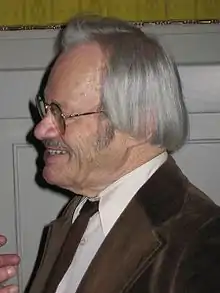Friedrich Cerha
Friedrich Cerha (born 17 February 1926) is an Austrian composer, conductor and music educator.
Friedrich Cerha | |
|---|---|
 Friedrich Cerha, in 2006, celebrating his 80th birthday | |
| Born | February 17, 1926 |
| Education | Vienna Music Academy, University of Vienna |
| Occupation | Composer and conductor |
| Years active | 1958–present |
| Children | Ruth Cerha |
Education and Career
Cerha was born in Vienna, Austria, and educated at the Viennese Music Academy (violin, composition, music education) and at the University of Vienna (music sciences, German culture and language, philosophy).
In 1958, together with Kurt Schwertsik, he founded the Ensemble die reihe, which was an important instrument for the spreading of contemporary music in Austria. In addition to composing, Cerha earned a reputation as an interpreter of the works of Alban Berg, Arnold Schoenberg and Anton Webern. This work included the completion of Alban Berg's unfinished three-act opera Lulu. Cerha orchestrated sections of the third act using Berg's notes as a reference. The opera was premiered by Pierre Boulez in Paris in 1979.[1]
Alongside his career as a composer, Cerha taught at the University of Music and Performing Arts in Vienna from 1959 and between 1976 and 1988 was Professor of Composition, Notation and Interpretation of New Music. Some of his notable students during this time include Georg Friedrich Haas, Karlheinz Essl,[1] Petr Kotik, Gerald Barry and Benet Casablancas.
Cerha has produced both orchestral works and opera (among others, Baal, Der Rattenfänger, and Der Riese vom Steinfeld, the latter commissioned by the Vienna State Opera, with a libretto by Peter Turrini). Premiere performances of some of his recent works took place in January 2006 (e.g. Impulse for large orchestra, dedicated to the Vienna Philharmonic Orchestra on the occasion of its 150th anniversary) as well as in March 2006 (Concerto for Soprano Saxophone and Orchestra, written in 2004).
Cerha, and his wife Gertraud Cerha a music historian, were founder members of the Joseph Marx Society in April 2006.[2]
Wartime activities
Cerha was conscripted, aged 17, as a Luftwaffenhelfer and initially served in Achau, near Vienna. During this time, he participated in acts of resistance. After a semester at the University of Vienna, he was sent to an Officer's school in occupied Denmark. While there, he obtained a number of blank, but signed, marching order papers and deserted. These papers allowed him to remain undetected within German territory for some time as he could use them as proof that he was supposed to be there. However, after a period, he was forced to rejoin a military unit, during an advance by the Russian forces near Pomerania. He deserted a second time and made his way to the west of Austria, where he lived in the mountains for several months, to avoid capture by the Allied forces, until he was eventually able to return Vienna.[3]
Decorations and awards
- 1964: Theodor Körner Prize[4]
- 1986: Grand Austrian State Prize for Music[4]
- 1986: Gold Medal of the Province of Styria[4]
- 1986: Honorary Medal of Vienna in gold[4]
- 1988: Honorary Member of the Vienna Konzerthaus[5]
- 2005: Austrian Decoration for Science and Art[6]
- 2006: Golden Lion of the Venice Music Biennale[4]
- 2007: Honorary Member of the Society of Friends of Music in Vienna[5]
- 2008: Gold Medal for services to the City of Vienna[4]
- 2010: Silver Commander's Cross of Honour for Services to the province of Lower Austria[4]
- 2011: Salzburg Music Prize[4]
- 2012: Ernst von Siemens Music Prize[4][1]
Honorary doctorates
- 2017: Universität Siegen[7]
Notable Works
Operas
- Netzwerk, 1981
- Baal, 1974/81 – Text: Bertolt Brecht
- Der Rattenfänger, 1987 – Text: Carl Zuckmayer
- Komplettierung der Oper Lulu von Alban Berg, 1962–78
- Der Riese vom Steinfeld, 2002 – Text: Peter Turrini, 2002
- Onkel Präsident, 2013 – Text: Peter Wolf and Friedrich Cerha
Other works
- Spiegel I–VII, 1960–72
- Sinfonie, 1975
- Requiem für Hollensteiner, 1982/83
- Baal-Gesänge, 1983
- Keintaten, 1983 ff.
- Momentum für Karl Prantl, 1988
- Fünf Stücke für Klarinette in A, Violoncello und Klavier, 1999–2000
- Konzert für Sopransaxophon und Orchester, 2003–2004
- Konzert für Violine und Orchester, 2004
- Quintett für Oboe und Streichquartett, 2007
- Konzert für Schlagzeug und Orchester, 2007–2008
- Like a Tragicomedy für Orchester, 2008–2009
- Bruchstück, geträumt für Ensemble, 2009
- Paraphrase über den Anfang der 9. Symphonie von Beethoven, 2010
- Zebra-Trio, for string trio, 2011
- Tagebuch für Orchester, 2012
- Drei Sätze für Orchester, 2015[8]
References
- "Friedrich Cerha, Biography". evs-musikstiftung.ch. Ernst von Siemens Musikstiftung. Retrieved 18 November 2019.
- "The Executive Committee :: Joseph Marx Society". www.joseph-marx-gesellschaft.org. Retrieved 2020-12-14.
- "Wörtlich – Friedrich Cerha", Radio Orange 94.0 Vienna, 16. u. 23. January 2017
- Harrandt, Andrea (2001). "Cerha, Friedrich". Oesterreichisches Musiklexikon online. Retrieved 17 November 2019.
- "Cerha, Friedrich". austria-forum.org. TU Graz. 2003. Retrieved 17 November 2019.
- "Reply to a parliamentary question" (pdf) (in German). p. 1665. Retrieved 5 January 2013.
- "Cerha, Friedrich". kurienwissenschaftundkunst.at. Bundeskanzleramt. Retrieved 17 November 2019.
- "Friedrich Cerha - Database". en.karstenwitt.com. Retrieved 2020-12-14.
External links
- Official Website
- Biography Friedrich Cerha (Sabine Töfferl, New Academic Press 2017; German language)
- Ensemble "die reihe"
- Friedrich Cerha biography and works on the UE website (publisher)]
- Laudation for Friedrich Cerha by Karlheinz Essl (March 16, 2017)